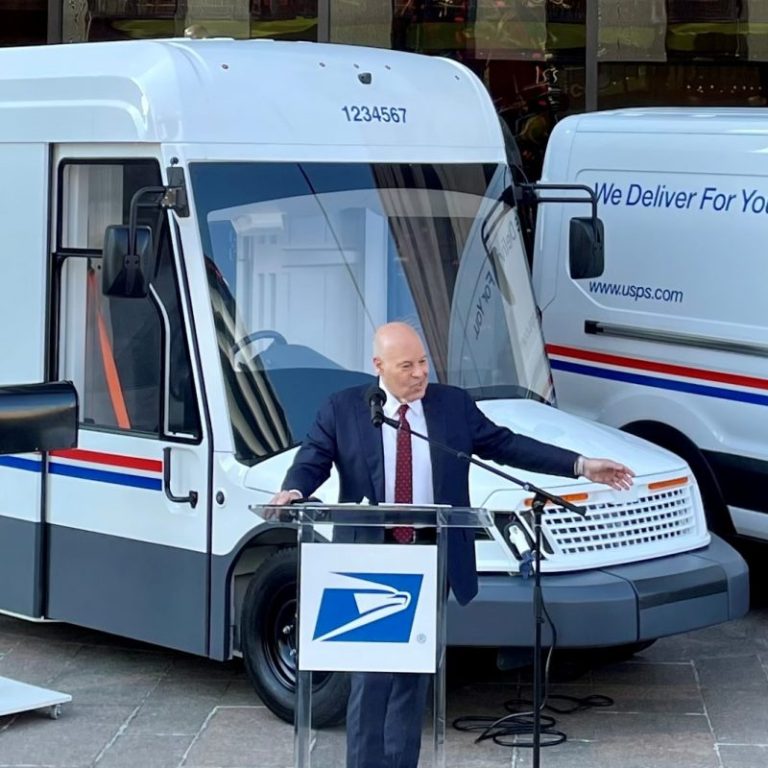Louis DeJoy is one general who won’t deploy his troops where needed — on the front lines of the fight against crime.
As postmaster general of the United States and chief executive of the U.S. Postal Service, DeJoy oversees hundreds of armed, uniformed police officers who are sworn to protect “employees, infrastructure, and customers … and ensure public trust in mail.”
The public might have more trust in a Postal Service plagued with escalating crime if DeJoy sent his police officers to preempt crimes by conducting street patrols to protect employees. Under current policy, the Postal Police guard post offices and other facilities, but don’t protect employees on the streets.
Some of those streets are dangerous.
A Postal Service report shows postal thefts are soaring. The first six months of fiscal 2023 recorded 305 thefts from letter carriers. If that rate continues, it will mean 610 thefts from letter carriers for all of 2023, a 48 percent jump over last year’s 412. The “increase in high volume mail theft” from receptacles including blue mailboxes resulted in 25,000 thefts in the first half of 2023, a rate of 50,000 for the year or a 46 percent jump from last year’s total of 38,500.
DeJoy’s plan “to crack down on mail theft” and “enhance employee safety” dismayed Rep. Jamie Raskin (D-Md.) at a May 17 House Government and Accountability subcommittee hearing. Raskin said the plan is “baffling to me” and “very light on proactive protection for letter carriers.” The nationwide plan includes installing 12,000 high-security blue mailboxes and electronic locks on 49,000 mail receptacles.
Why, Raskin asked, “has the Postal Service continued to prevent Postal Police Officers from doing their jobs … by traveling to wherever the problem is taking place?”
DeJoy responded, “I don’t have the authority to patrol the streets. And they haven’t done that in the past …. We don’t have the legal authority to do that.”
He’s wrong about past practice and that’s not exactly what a federal district court found about his authority.
Declaring DeJoy “grossly misinformed,” Frank Albergo, president of the Postal Police Officers Association, said by email that “PMG DeJoy is flat out wrong when he claimed Postal Police Officers (PPOs) have not conducted carrier protection and mail theft prevention patrols.” Among other documentation, he cited:
• A March 2012 USPS website article that said keeping carriers safe in Chicago “means using Postal Police Officers on street patrols.” The article quotes letter carriers saying: “The patrols make me feel a lot more comfortable while delivering mail,” and “The patrols make me feel safe,” and “It shows the Postal Service cares for my safety because they’re out here checking on us.”
• An August 2020 “management communication” directive stopping street patrols, saying “effective immediately any off-property utilization of PPOs requires prior approval” of deputy chief inspectors. The Wall Street Journal covered the directive that October with the headline “U.S. Postal Service benches its police officers before election.”
• A 2021 arbitration decision said “Postal Police have been ‘police officers,’ with duties that are comparable to police patrol officers or sheriff’s patrol officers …. PPOs’ primary duties are very similar to the vast majority of patrol police officers’ duties.” The arbitration panel found “PPOs routinely perform police patrol officer and sheriff patrol officer duties” and were “were directed to hot spots” in Chicago “where gang activity, gang retaliation shootings, mail theft, assaults on carriers, robberies of carriers, were flourishing.” Miami PPOs previously spent their “entire workday” on mobile patrol to protect carriers and in Newark PPOs used mobile patrols to “meet with carriers, speak to them, make sure they’re okay in the bad parts of town.”
The House Postal Police Reform Act would reverse the 2020 directive and allow postal cops to once again fight street crimes against USPS employees “wherever they are located,” Del. Eleanor Holmes Norton (D) said in a news release.
Acknowledging the past practice of postal street patrols after The Washington Post questioned his hearing statements, DeJoy said that previous activity doesn’t permit continued unauthorized behavior.
The Postal Service, “certainly any components of our law enforcement arm,” he said by email, “must always adhere strictly to actions they have the statutory authority to perform. Past failures to adhere to that limited authority must not be a justification for continuing to do so.”
USPS spokesman David A. Partenheimer cited a federal law that says USPS “may employ police officers for duty in connection with property owned or occupied by the Postal Service” and a 2020 federal court decision dismissing a union lawsuit against the agency’s decision restricting its police officers’ jurisdiction. U.S. District Court Judge Christopher R. Cooper in Washington said USPS “did not act unreasonably” when interpreting the law as limiting Postal Police duties “to the protection of Postal Service real property.”
But Albergo pointed to the rest of that sentence in the court’s ruling that said management could “leave the question of PPOs’ off-premises policing authority to USPS’s discretion,” which indicates DeJoy could deploy Postal Police to street patrols if he wanted to.
Yet, even if he wanted to, USPS doesn’t have enough cops for street patrols, he told Raskin.
“If I had 60,000 of them, I would come to you and ask for the authority,” DeJoy said. “I don’t. I have 600 and I don’t have the authority to patrol the streets.”
Albergo said the actual number is 700, but the real issue is deploying them “in 20 specific geographic locations, not 700 officers spread out across America …. There are certain Zip codes and delivery routes that are being targeted by criminals — most of which are in the very locations where there are in fact PPOs.”
Citing the court decision leaving street patrols to USPS discretion, Albergo’s email said “NOTHING is stopping PMG DeJoy from deploying PPOs to protect letter carriers.”

